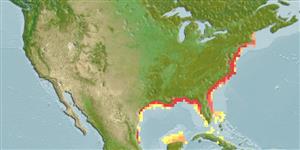Common names from other countries
分類 / Names
共通名の | 類義語 | Catalog of Fishes(部類, 種) | ITIS | CoL | WoRMS | Cloffa
>
Clupeiformes (Herrings) >
Dorosomatidae (Gizzard shads and sardinellas)
Etymology: Dorosoma: Greek, doris = lance + Greek, soma = body (Ref. 45335); cepedianum: Doro=lanceolate; soma=body (referring to the body shape of the young), and cepedianum, in honor of Bernard Germain Etienne de la Ville sur Ilion, Comte de La Cepede (1756-1825) (Ref. 79012).
More on author: Lesueur.
Environment: milieu / climate zone / depth range / distribution range
生態学
海; 新鮮な水; 汽水性の; 昇流魚 (Ref. 51243); 深さの範囲 0 - 33 m (Ref. 39020). Subtropical; ? - 32°C (Ref. 12741); 49°N - 21°N, 108°W - 70°W (Ref. 188)
Northwest Atlantic: North America and Gulf of Mexico drainage (southeast South Dakota and central Minnesota, Great Lakes drainage, i.e. in Lake Erie, southern parts of Lakes Huron and Michigan, Lake Ontario basin; not Lake Superior; southernmost New York southward to the Mississippi system and to Gulf southward to Río Pánuco, Mexico.
Length at first maturity / サイズ / 重さ / 年齢
Maturity: Lm 36.1 range ? - ? cm
Max length : 57.0 cm FL オス/雌雄の選別がない; (Ref. 40637); common length : 35.0 cm SL オス/雌雄の選別がない; (Ref. 7251); 最大公表体重: 2.0 kg (Ref. 40637); 最大記録サイズ: 10 年 (Ref. 72462)
背面の脊椎 (合計) : 0; 背鰭 (合計) : 10 - 15; 肛門の骨: 0; 臀鰭: 25 - 36; 脊つい: 47 - 51. Body moderately deep; belly with 17 to 20 - 10 to 14 scutes. Mouth small; lower jaw short. Last dorsal fin ray long, about equal to distance from snout tip to mid-pectoral fin or beyond; anal fin long. Scales small, somewhat irregular. A dark spot behind gill opening. Gill rakers fine and numerous (Ref. 188). Branchiostegal rays 6 (Ref. 4639). Silvery to brassy, with a bluish back. Stomach thick-walled, gizzard-like (Ref. 7251).
Inhabits open water of medium to large rivers, lakes, and impoundments. Ascends creeks and small rivers with well-developed pools and enters brackish water (Ref. 86798). Occurs mainly in freshwater in large rivers, reservoirs, lakes, swamps, temporary floodwater pools, etc., but adults also found in brackish or saline water of estuaries or bays, preferring quieter open waters. Juveniles are found in great abundance well upstream from brackish water (Ref. 39041). Very young individuals apparently never enter brackish water (Ref. 38947). Larvae are most abundant in surface waters both day and night (Ref. 4639). A herbivorous filter-feeder almost entirely. Breed near the surface in freshwater from late winter (mid-March) through most of the summer (at least to about mid-August). The adhesive eggs sink. Used to some extent as fertilizer and cattle food (Ref. 188).
Temperature range for spawning: 10°C-28.9°C (Ref. 39042), usually most active above 18°C (Ref. 862, 3742).
Whitehead, P.J.P., 1985. FAO Species Catalogue. Vol. 7. Clupeoid fishes of the world (suborder Clupeoidei). An annotated and illustrated catalogue of the herrings, sardines, pilchards, sprats, shads, anchovies and wolf-herrings. FAO Fish. Synop. 125(7/1):1-303. Rome: FAO. (Ref. 188)
CITES (Ref. 128078)
Not Evaluated
Human uses
水産業: 少数商業の; ゲームフィッシュ: はい; 餌: usually
用具
特記事項
XMLをダウンロードして下さい
インターネットの情報源
Estimates based on models
Preferred temperature (Ref.
115969): 12.8 - 26.8, mean 24 (based on 244 cells).
Phylogenetic diversity index (Ref.
82804): PD
50 = 0.5312 [Uniqueness, from 0.5 = low to 2.0 = high].
Bayesian length-weight: a=0.00912 (0.00790 - 0.01053), b=3.04 (3.00 - 3.08), in cm Total Length, based on LWR estimates for this species (Ref.
93245).
栄養段階 (Ref.
69278): 2.4 ±0.21 se; based on food items.
回復力 (Ref.
120179): 手段, 1.4年~4.4年の倍増期間の最小個体群 (tm=2; tmax=6).
Fishing Vulnerability (Ref.
59153): Low to moderate vulnerability (30 of 100).
Climate Vulnerability (Ref.
125649): Moderate to high vulnerability (49 of 100).
